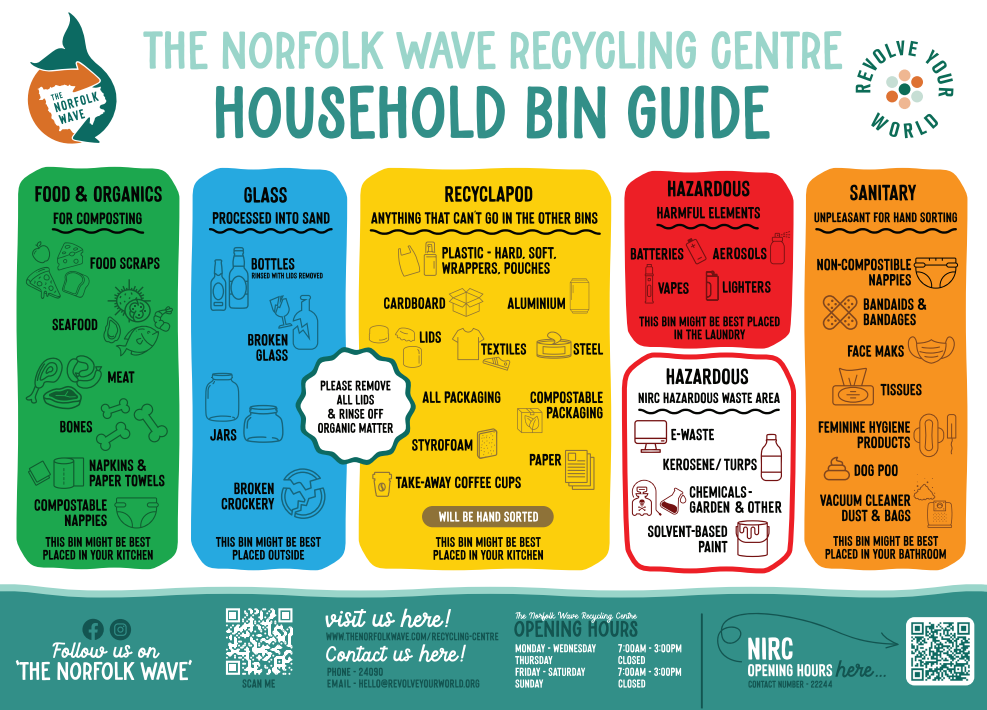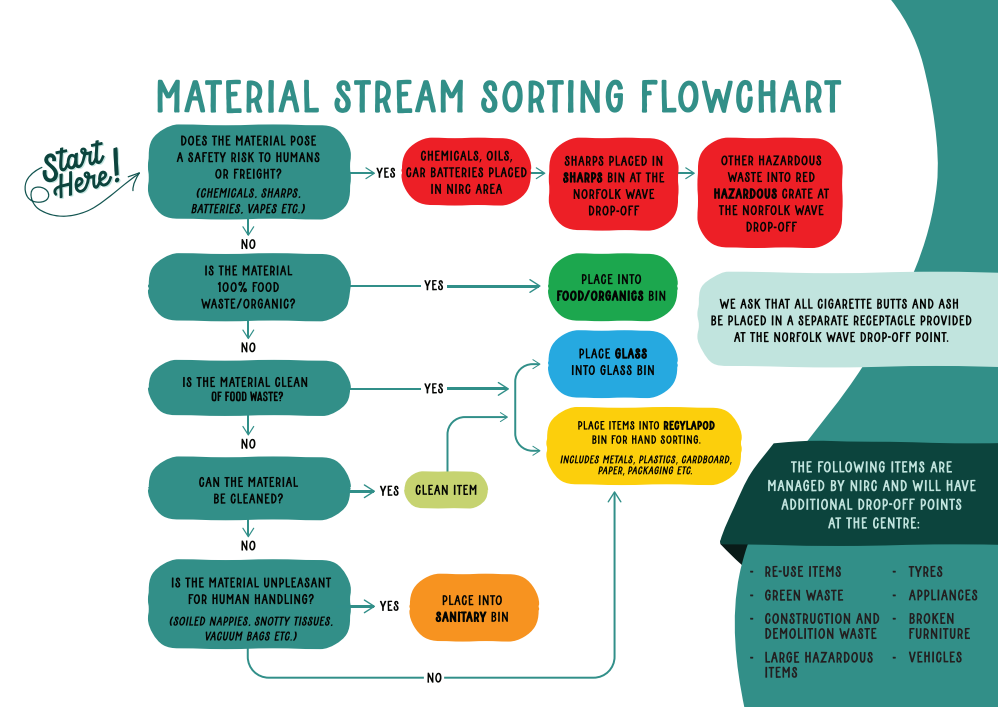Waste Management Centre
Norfolk Island Regional Council offers a variety of waste management services to the community. Currently these are provided through different operations - domestic and commercial waste management services are provided by contractors, Revolve Your World, at the Norfolk Wave Recycling Centre, while bulky, construction and demolition waste management is operated by Council staff.
Domestic and Commercial Waste Managment (RYW-operated)
The Norfolk Wave Recycling Centre (TNW) opened on Norfolk Island in August 2023, on the same site as the previous Waste Management Centre. Operated by Revolve Your Word, a small waste management and recycling company that focuses on custom-built solutions to waste management problems, TNW is based on a circular economy model with an emphasis on resource recovery. TNW manages Norfolk Island’s residential and commercial waste through a combination of tried and tested technologies that allow for maximum recycling to take place on island and results in sustainable products being available to the community.
TNW is a drop-off facility for both residents and visitors. The success of the system relies on the quality of waste materials going in, in order for high quality materials to come out. TNW asks that all who are utilising the centre sort their waste materials into five (5) simple waste streams, with an emphasis on materials being clean of food waste and other contaminants.
The five waste streams are outlined in the bin guide below.


At TNW we don’t view community rubbish as ‘waste’, but rather as a resource. Many different products can be produced from these materials, such as is happening at TNW. From plastic and cardboard we are creating high quality concrete aggregate that substitutes the need to mine and crush rock on island. From glass we’re creating glass sand of various grades for a range of uses. Food scraps, compostable packaging and paper are all converted into high quality compost to support food security on island. Metals and textiles are being exported for recycling in Australia.
RYW Opening Hours
| Sunday | Closed |
| Monday | 7:00am - 2:00pm |
| Tuesday | 7:00am - 2:00pm |
| Wednesday | 7:00am - 2:00pm |
| Thursday | Closed |
| Friday | 7:00am - 2:00pm |
| Saturday | 7:00am - 3:00pm |
More information can be found about The Norfolk Wave at www.thenorfolkwave.com or by following The Norfolk Wave on facebook and instagram
Bulky, Construction and Demolition Waste (NIRC Operated)
All bulky, construction, demolition and other non-compactable waste is to be delivered to the NIRC area of the Waste Management Centre (WMC). An area has been established at the rear of the WMC shed, with waste streams for timber, hard plastic and other non-compactable waste. Note, all steel and aluminium waste products, aside from cans and tins, are to be placed at the scrap metal pile adjacent to the car crusher; green waste is to be placed on the upper level behind the Biosecurity Shed. WMC Staff will be available to assist customers with their questions about bulky waste separation and disposal of different streams. Access to these deposit areas will be open during the hours below and will be monitored by staff.
Bulky Waste Opening Hours
| Sunday | Closed |
| Monday | 7:00am - 3:00pm |
| Tuesday | 7:00am - 3:00pm |
| Wednesday | 7:00am - 12:00pm |
| Thursday | 7:00am - 12:00pm |
| Friday | 7:00am - 3:00pm |
| Saturday | 7:00am - 3:00pm |
Compost
Compost is derived from recycled organic materials processed by natural organisms. It offers multiple soil benefits by nourishing plants, improving soil structure, and retaining crucial nutrients.
Composting helps lower the amount of food waste that goes to landfills, and it creates a natural, budget-friendly resource for gardens, promoting healthier soil and conserving water.
How can I get compost?
Here are two ways to get compost on Norfolk Island:
- You can start composting your organic waste.
- You can use this step by step guide on how to compost effectively to start (How to compost effectively: step-by-step guide | Department of Environment and Science, Queensland (des.qld.gov.au)).
- You can purchase compost from NIRC.
- Go to Customer Care and pay for the desired amount of compost, as per Council’s scheduled Fees and Charges (Fees and Charges – Norfolk Island Regional Council (nirc.gov.au))
- Arrange pickup at the Waste Management Centre - contact Section Leader, Waste Management - 53280)
Using compost safely
Compost can be a source of microbial, chemical and physical contamination given its nature. NIRC uses an established composting process (in-vessel composting), as well as yearly testing to ensure that the compost available to the community is safe. Even with this monitoring and controls in place, growers should handle compost safely to avoid contamination.
General hygiene rules when handling compost
- Keep cuts covered
- Wash hands with soap and running water after handling compost, before eating or drinking, after removing your gloves
- Avoid touching your face when handling compost
- Wear gloves
Other measures to manage exposure
- To reduce exposure to dust
- wet potting mix and compost before handling, during use and when cleaning up to keep it moist
- open bags of potting mix carefully and direct the opening away from the face
- handle potting mix and compost in a well-ventilated area
- when emptying bags of potting mix and applying compost, avoid shaking the bag and keep the product close to the ground
- avoid using water under high pressure on potting mix and compost
- wear a properly fitted particulate respirator (e.g. disposable half-face respirator with a P1 or P2 filter) when handling potting mix and compost and turning over compost heaps
- Store bagged potting mix in a cool, dry place and out of direct sunlight
- Wash work clothes regularly
Asbestos disposal
Asbestos poses serious health risks, and exposure can be extremely hazardous to human health. The Waste Management Company (WMC) is tasked with stockpiling and exporting asbestos for proper disposal.
Individuals who need to dispose of asbestos should ensure appropriate packaging and bring it to the WMC. Upon arrival, WMC staff will inspect and measure the box/bags containing the asbestos waste to issue an invoice. The disposal fee for asbestos is included in NIRC's Operational Plan - Fees and Charges. Please find packaging instructions below:
To guarantee the safe export of asbestos waste and comply with the Asbestos Safety and Eradication Agency (ASEA) permit, individuals willing to export asbestos must pack it appropriately.
Asbestos waste materials intended for export must be:
- Double-wrapped in 200um plastic and contained in 200um plastic lined plywood crates, securely strapped.
- Crates must be made of 18mm marine plywood.
- Enclosed in transport-approved asbestos hazbags rated up to 1.5 tonnes and securely strapped to wooden pallets.
- Packages must not exceed a maximum size of 2700mm in length and 1200mm in width.
- Labelled with stickers of at least 75mm x 90mm in size, displaying the following warning: "CAUTION ASBESTOS. DO NOT OPEN OR DAMAGE BAG. DO NOT INHALE DUST."
Headstone
A small amount of butchers' waste is still deposited at Headstone to assist with shark research being conducted by Flinders University.
Contact us for information on construction, bulky and green waste, asbestos, butcher's waste:
Section Leader – Waste Management
Douglas Drive
Norfolk Island 2899
Phone 53280
Email: paul.anderson@nirc.gov.nf
